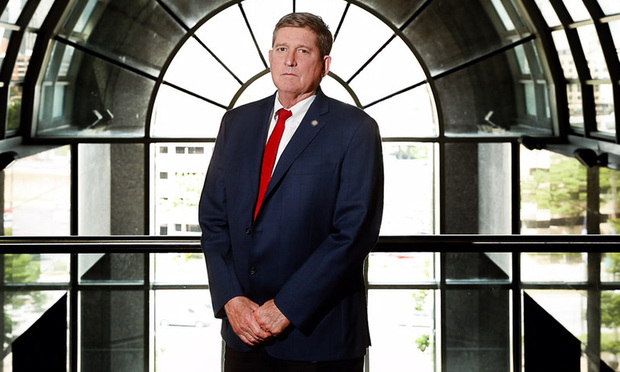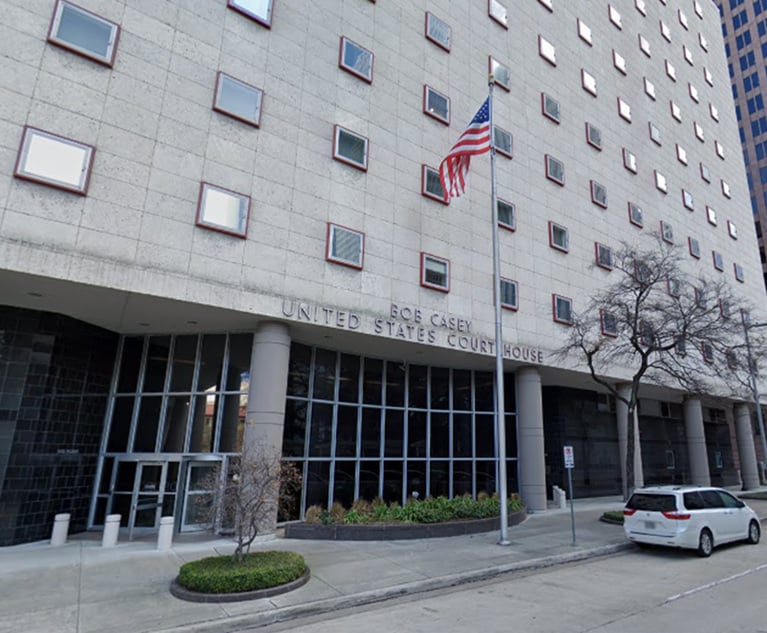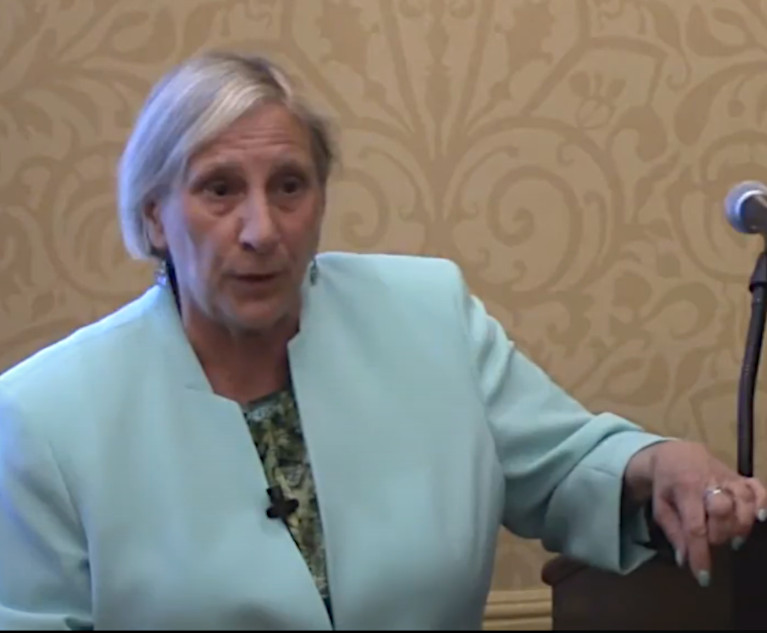Litigator of the Week: A Rare Murder Conviction of a Police Officer
“I can't overemphasize this,” Dallas County First Assistant District Attorney Mike Snipes said. “To me ... the case was never a political case. It wasn't about white vs. black or Democrat vs. Republican. I didn't do it because of that. I did it for the kid. If you knew the kid like I did, you would love him.”
September 05, 2018 at 06:03 PM
5 minute read
 Michael Snipes, Dallas County first assistant district attorney/photo by Tracy Nanthavongsa
Michael Snipes, Dallas County first assistant district attorney/photo by Tracy Nanthavongsa
Police officers are rarely convicted of murder in connection with on-the-job fatal shootings.
That's why it was a historic moment on Aug. 28 when Mike Snipes, Dallas County's first assistant district attorney, convinced a jury to convict former Balch Springs police officer Roy Oliver of murder and sentence him to 15 years in prison.
Oliver, who is white, fatally shot 15-year-old Jordan Edwards, who was black, as Edwards was leaving a house party with his friends last year. Edwards was unarmed. Oliver has claimed he was acting in defense of his partner when he fired his weapon.
Regardless of the circumstances, juries often sympathize with police officers charged with crimes, given the dangerous nature of their jobs, which sometimes involve split-second decisions on whether to end a person's life with a gun.
Snipes believes he won a conviction because, in addition to having police body camera video evidence showing that it was unnecessary for Oliver to shoot the boy who was fleeing the party because of the sound of nearby gunshots, he had several eyewitnesses to Edwards' slaying.
But, Snipes said, the conviction is owing just as much to the victim—a young, smart, athletically talented African-American teen who stayed out of trouble, got good grades, and planned on going to college.
“It was pure luck. I can say now it's nearly impossible to get a convictions in these cases,” Snipes said of the victory. “If you take away any one of those, we lose.”
“And I'll tell you this. I'm by no means the best trial lawyer in that office,” said Snipes, whose primary job as first assistant DA is managing hundreds of young Dallas prosecutors. “But I knew early on it was going to be a gut wrenching. And I didn't want any of my kids taking that case, losing it, and having to live with it for the rest of their lives.”
Dallas County District Attorney Faith Johnson decided to charge Oliver with murder just days after Edwards was killed. It was a highly unusual move as it usually takes months before prosecutors charge police officers with crimes—if at all, given their close relationship with law enforcement. Snipes told Johnson that he wanted to be the office's lead lawyer on the case, along with prosecutors George Lewis and Shawnkeedra Martin.
“He asked me immediately,” said Johnson, who agreed to Snipes' request and participated in the case herself by cross-examining a witness and helping give the closing argument. “I knew that Mike is a hard worker, he is intense, and he would do everything he could to represent this office and this family in a great way.”
Snipes' primary job at the office after Edward's slaying was Oliver's prosecution, Johnson said.
“He just worked this case day and night. He would be here on Saturday and Sunday,” Johnson said. “And there wasn't a witness in the case that he didn't talk to at least four times—sometimes seven. He knew every second of everything that happened in the case. I don't think I could have found another prosecutor who was as committed as he was.”
Daryl Washington, a Dallas attorney who represents the Edwards family, attended every day of Oliver's murder trial and rated Snipes' trial performance as “stellar.”
“Mike was prepared, believed in the case, and it showed when he presented the case to the jury,” Washington said. “One of the things Mike and his team were really able to do was get the jury to take the police uniform off and look at this person as an individual.
“Police officers have a tough job, and bad police officers get lumped in with good police officers,” he continued. “And Mike was able to convince the jury not to give this officer the benefit of the doubt.”
The jury's decision to give Oliver a fraction of the 60 years in prison that Snipes had requested was a disappointment to the Edwards family, Washington said.
“Obviously, the family wanted this officer to serve more time in prison for taking the life of Jordan Edwards and risking the lives of other teenage boys,” Washington said. “But when we were able to sit back and think about this and realize that this police officer was found guilty of murder and will spend 15 years in prison, it's a start.''
Bob Gill, a Fort Worth attorney who represented Oliver in the trial, said his client will appeal his conviction and sentence.
“Our defense was that he was defending his partner,'' Gill said of Oliver. “Our client testified that he feared for the life of his partner and that caused him to do what he did.”
Snipes said a big part of his motivation in the case was that he came to adore Jordan Edwards—a teen he'd never met.
“I can't overemphasize this,” Snipes said. “To me, Mike Snipes, the case was never a political case. It wasn't about white vs. black or Democrat vs. Republican. I didn't do it because of that. I did it for the kid. If you knew the kid like I did, you would love him.”
This content has been archived. It is available through our partners, LexisNexis® and Bloomberg Law.
To view this content, please continue to their sites.
Not a Lexis Subscriber?
Subscribe Now
Not a Bloomberg Law Subscriber?
Subscribe Now
NOT FOR REPRINT
© 2025 ALM Global, LLC, All Rights Reserved. Request academic re-use from www.copyright.com. All other uses, submit a request to [email protected]. For more information visit Asset & Logo Licensing.
You Might Like
View All
JCPenney Seeks Return of More Than $1.1M From Jackson Walker For Bankruptcy Work
3 minute read
HUD Charges Texas HOA With Housing Discrimination in Last Days of Biden Administration
5 minute read
How We Won It: Latham Secures Back-to-Back ITC Patent Wins for California Companies
6 minute read
Federal Judge Approves Harvard's Dismissal of Chip-Patent Suit Against Samsung
2 minute readTrending Stories
- 1Gunderson Dettmer Opens Atlanta Office With 3 Partners From Morris Manning
- 2Decision of the Day: Court Holds Accident with Post Driver Was 'Bizarre Occurrence,' Dismisses Action Brought Under Labor Law §240
- 3Judge Recommends Disbarment for Attorney Who Plotted to Hack Judge's Email, Phone
- 4Two Wilkinson Stekloff Associates Among Victims of DC Plane Crash
- 5Two More Victims Alleged in New Sean Combs Sex Trafficking Indictment
Who Got The Work
J. Brugh Lower of Gibbons has entered an appearance for industrial equipment supplier Devco Corporation in a pending trademark infringement lawsuit. The suit, accusing the defendant of selling knock-off Graco products, was filed Dec. 18 in New Jersey District Court by Rivkin Radler on behalf of Graco Inc. and Graco Minnesota. The case, assigned to U.S. District Judge Zahid N. Quraishi, is 3:24-cv-11294, Graco Inc. et al v. Devco Corporation.
Who Got The Work
Rebecca Maller-Stein and Kent A. Yalowitz of Arnold & Porter Kaye Scholer have entered their appearances for Hanaco Venture Capital and its executives, Lior Prosor and David Frankel, in a pending securities lawsuit. The action, filed on Dec. 24 in New York Southern District Court by Zell, Aron & Co. on behalf of Goldeneye Advisors, accuses the defendants of negligently and fraudulently managing the plaintiff's $1 million investment. The case, assigned to U.S. District Judge Vernon S. Broderick, is 1:24-cv-09918, Goldeneye Advisors, LLC v. Hanaco Venture Capital, Ltd. et al.
Who Got The Work
Attorneys from A&O Shearman has stepped in as defense counsel for Toronto-Dominion Bank and other defendants in a pending securities class action. The suit, filed Dec. 11 in New York Southern District Court by Bleichmar Fonti & Auld, accuses the defendants of concealing the bank's 'pervasive' deficiencies in regards to its compliance with the Bank Secrecy Act and the quality of its anti-money laundering controls. The case, assigned to U.S. District Judge Arun Subramanian, is 1:24-cv-09445, Gonzalez v. The Toronto-Dominion Bank et al.
Who Got The Work
Crown Castle International, a Pennsylvania company providing shared communications infrastructure, has turned to Luke D. Wolf of Gordon Rees Scully Mansukhani to fend off a pending breach-of-contract lawsuit. The court action, filed Nov. 25 in Michigan Eastern District Court by Hooper Hathaway PC on behalf of The Town Residences LLC, accuses Crown Castle of failing to transfer approximately $30,000 in utility payments from T-Mobile in breach of a roof-top lease and assignment agreement. The case, assigned to U.S. District Judge Susan K. Declercq, is 2:24-cv-13131, The Town Residences LLC v. T-Mobile US, Inc. et al.
Who Got The Work
Wilfred P. Coronato and Daniel M. Schwartz of McCarter & English have stepped in as defense counsel to Electrolux Home Products Inc. in a pending product liability lawsuit. The court action, filed Nov. 26 in New York Eastern District Court by Poulos Lopiccolo PC and Nagel Rice LLP on behalf of David Stern, alleges that the defendant's refrigerators’ drawers and shelving repeatedly break and fall apart within months after purchase. The case, assigned to U.S. District Judge Joan M. Azrack, is 2:24-cv-08204, Stern v. Electrolux Home Products, Inc.
Featured Firms
Law Offices of Gary Martin Hays & Associates, P.C.
(470) 294-1674
Law Offices of Mark E. Salomone
(857) 444-6468
Smith & Hassler
(713) 739-1250






